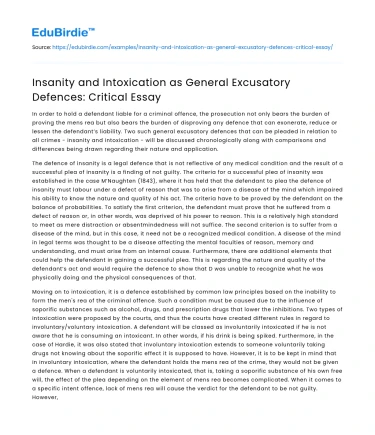In order to hold a defendant liable for a criminal offence, the prosecution not only bears the burden of proving the mens rea but also bears the burden of disproving any defence that can exonerate, reduce or lessen the defendant’s liability. Two such general excusatory defences that can be pleaded in relation to all crimes - insanity and intoxication - will be discussed chronologically along with comparisons and differences being drawn regarding their nature and application.
The defence of insanity is a legal defence that is not reflective of any medical condition and the result of a successful plea of insanity is a finding of not guilty. The criteria for a successful plea of insanity was established in the case M’Naughten (1843), where it has held that the defendant to plea the defence of insanity must labour under a defect of reason that was to arise from a disease of the mind which impaired his ability to know the nature and quality of his act. The criteria have to be proved by the defendant on the balance of probabilities. To satisfy the first criterion, the defendant must prove that he suffered from a defect of reason or, in other words, was deprived of his power to reason. This is a relatively high standard to meet as mere distraction or absentmindedness will not suffice. The second criterion is to suffer from a disease of the mind, but in this case, it need not be a recognized medical condition. A disease of the mind in legal terms was thought to be a disease affecting the mental faculties of reason, memory and understanding, and must arise from an internal cause. Furthermore, there are additional elements that could help the defendant in gaining a successful plea. This is regarding the nature and quality of the defendant’s act and would require the defence to show that D was unable to recognize what he was physically doing and the physical consequences of that.
Save your time!
We can take care of your essay
- Proper editing and formatting
- Free revision, title page, and bibliography
- Flexible prices and money-back guarantee
Moving on to intoxication, it is a defence established by common law principles based on the inability to form the men's rea of the criminal offence. Such a condition must be caused due to the influence of soporific substances such as alcohol, drugs, and prescription drugs that lower the inhibitions. Two types of intoxication were proposed by the courts, and thus the courts have created different rules in regard to involuntary/voluntary intoxication. A defendant will be classed as involuntarily intoxicated if he is not aware that he is consuming an intoxicant. In other words, if his drink is being spiked. Furthermore, in the case of Hardie, it was also stated that involuntary intoxication extends to someone voluntarily taking drugs not knowing about the soporific effect it is supposed to have. However, it is to be kept in mind that in involuntary intoxication, where the defendant holds the mens rea of the crime, they would not be given a defence. When a defendant is voluntarily intoxicated, that is, taking a soporific substance of his own free will, the effect of the plea depending on the element of mens rea becomes complicated. When it comes to a specific intent offence, lack of mens rea will cause the verdict for the defendant to be not guilty. However, if a basic intent alternative offence is available, such as murder or manslaughter, he may be convicted of that offence. The question to be asked to the jury in such a scenario is whether the defendant would have formed the mens rea if he was sober. If the answer results in a yes, then the defendant may be convicted.
In light of the above discussion, we can see that intoxication and insanity are two very contrasting defences. Although there is one common element in regards to the nature of both of them. It is the defect of reason. However, both arise from different grounds. In insanity, it arises from a disease of the mind, whereas in intoxication it arises from the influence of a soporific substance. The effect of a successful plea under insanity usually results in a special verdict of not guilty, whereas in intoxication the mens rea is an important element and intent, such as basic or specific form, an important part of the judgement. Thus, it can be said that although general and excusatory defences both are widely contrasting in their nature and application.






 Stuck on your essay?
Stuck on your essay?

